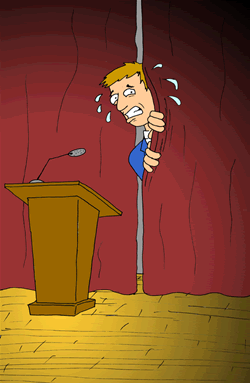

1. Talking too fast
Talking too fast is usually caused by nervousness. It is very distracting and makes it harder for the audience to appreciate what you are saying. Although people who talk too fast are trying to keep the audience’s attention and get through to them better, they wind up alienating them. Many people also simply cannot understand a person who talks too quickly. Make sure to speak at a normal, steady rate from start to finish. Buy essays cheap how to learn speak right!
2. Poor posture
Having confident posture projects authority and commands attention. Poor posture communicates a lack of authority on your subject, a lack of enthusiasm and can also throw off your balance, making your presentation that much more difficult and stressful.
3. Talking too quietly
Speaking too quietly is an especially grave offense because if people cannot hear you, there is no point in giving the presentation in the first place. Gauging the right volume for each new venue will take some learning experience for new speakers. If you are having trouble calibrating your voice, it is better to speak too loudly than too softly. One common tip is to focus on speaking to the people farthest away, in the farthest row. If they can hear you, then everyone else in the audience will too.
4. Being disorganized
Always have a clear concept of what you are going to say and how you will organize the information. Your presentation does not have to be tightly scripted, but it should be organized enough for you to give a clear and easily understood presentation. A disorganized speaker is difficult and tedious to listen to.
5. Giving poor examples
Examples, analogies or anecdotes should support your main points and enhance understanding, not impede it. Part of the whole idea of examples is that they should be simpler and more easily grasped than the main points they are clarifying. If they are not, you will simply confuse everyone even more. Avoid complicated examples and meandering stories. Make them concise and simple.
6. Using too many words
This is different from talking too fast. Using too many words dilutes the significance of any given point in your presentation. Instead, try to summarize and simplify everything to not only fit within the allotted time constraints, but to also fit within people’s patience constraints. Using too many words to express yourself will not help the audience understand anything better. Use fewer words, and each word will have more power and communicative value.
7. Going off on tangents
This is essentially a case of distracting yourself. Avoid unrelated topics unless they serve some constructive purpose (like humor). Even if they seem interesting, too many of these diversions will drastically water down the presentation and reduce the audience’s understanding. Distracting yourself often happens with a presentation that is poorly organized from the start. If you have a clear agenda for yourself, you minimize your risk of going off on tangents.
8. Not getting to the point
Not “getting to the point” throughout your speech will significantly weaken your image. People want to hear what you have to say, and move on. It often helps to provide a summary or synopsis of your major points at the beginning of the presentation so people know what to expect and have a framework for listening to you. Throughout the speech, you can continue to summarize before getting into details on each main topic.
9. Not dressing well for the event/ audience
Clothes make a difference. Whether a well-tailored business suit at a corporate seminar or t-shirt and jeans at a talk for IT freelancers, you must dress appropriately for the occasion. The way you dress will communicate to your audience about your professionalism, knowledge on your subject, and overall relevance. Fashion is a silent language that constantly gives people around you information about yourself.
10. Not relaxing
Relaxing is as much for the audience’s benefit as for yours. Tense or nervous speakers are very distracting because they are constantly making verbal or facial ticks, or using excessive and distracting hand gestures, and general poor body language. All of these distract the audience from the message trying to be delivered. Many of the mistakes on this list stem from not being relaxed enough.
Browse Front PageShare Your IdeaComments
Read Elephant’s Best Articles of the Week here.
Readers voted with your hearts, comments, views, and shares:
Click here to see which Writers & Issues Won.








